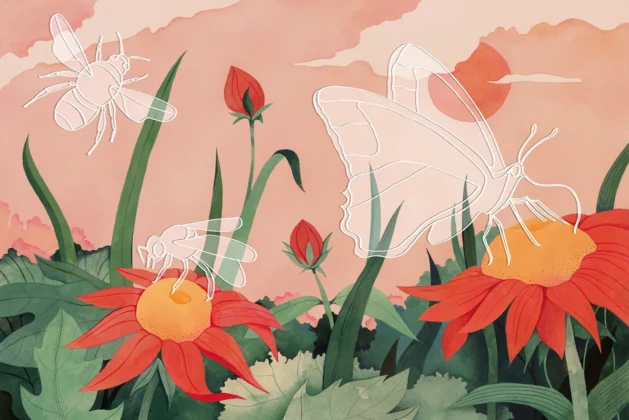We often hear about the extinction of tigers, elephants, or polar bears, but there’s another crisis happening quietly around us — The Hidden Extinction. Insects, the tiny creatures we usually ignore, are disappearing at alarming rates. This loss is not just about bugs; it’s about the collapse of ecosystems that sustain human life. Without insects, our world would look very different — and not in a good way.
Table of Contents
The Hidden Extinction: Why Insects Are Disappearing
Insects are vanishing faster than many larger animals. A growing body of research shows that populations of bees, butterflies, beetles, and even ordinary houseflies are shrinking. The causes are complex but connected: habitat destruction, pesticides, pollution, climate change, and urbanization. Forests and meadows are being replaced by concrete, farms are drenched in chemicals, and rising global temperatures disturb the delicate life cycles of these tiny creatures.
Scientists call this decline “insect apocalypse” — but because it happens slowly and quietly, most people barely notice it. That’s why it’s referred to as a Hidden Extinction.
Why Insects Matter More Than We Realize
It’s easy to think insects are annoying, but in reality, they are essential to life on Earth. Insects pollinate 75% of the world’s food crops, recycle nutrients in the soil, and form the foundation of food chains. Without them:
- Crops like fruits, vegetables, coffee, and chocolate would vanish.
- Birds, fish, reptiles, and mammals that feed on insects would decline.
- Forests and grasslands would struggle to regenerate.
In short, insects keep the planet running. When they disappear, everything else begins to unravel.
What Happens If Insects Vanish?
Imagine a world without bees or butterflies. Farmers would struggle to grow food, leading to food shortages and rising prices. Without insects to clean up waste and recycle nutrients, ecosystems would collapse into imbalance.
Scientists warn that losing insects doesn’t just affect nature — it affects human survival. The decline in insect populations is directly tied to food security, human health, and climate stability.
Can We Prevent The Hidden Extinction?
Yes, but it requires urgent action. Here’s what can help:
- Reducing pesticide use: Chemicals harm both harmful pests and beneficial insects like bees.
- Protecting habitats: Preserving forests, wetlands, and grasslands gives insects a chance to thrive.
- Planting native plants: Home gardens, parks, and cities can support pollinators with wildflowers.
- Promoting sustainable farming: Practices like crop rotation, organic farming, and reduced chemical use protect insect life.
Governments, communities, and individuals all have a role to play. Even small steps — like planting flowers on balconies or avoiding chemical sprays — can make a big difference.
Conclusion: Saving the Smallest Means Saving Ourselves
The Hidden Extinction of insects is one of the most overlooked environmental crises of our time. While they may be small, insects hold up entire ecosystems. Ignoring their decline means risking food shortages, collapsing food chains, and an unstable planet.
If we protect insects, we protect ourselves. After all, when the smallest life forms thrive, so does everything else — including humanity.
Read More: Heatwaves and Human Health: Why Extreme Temperatures Are More Dangerous Than You Think




